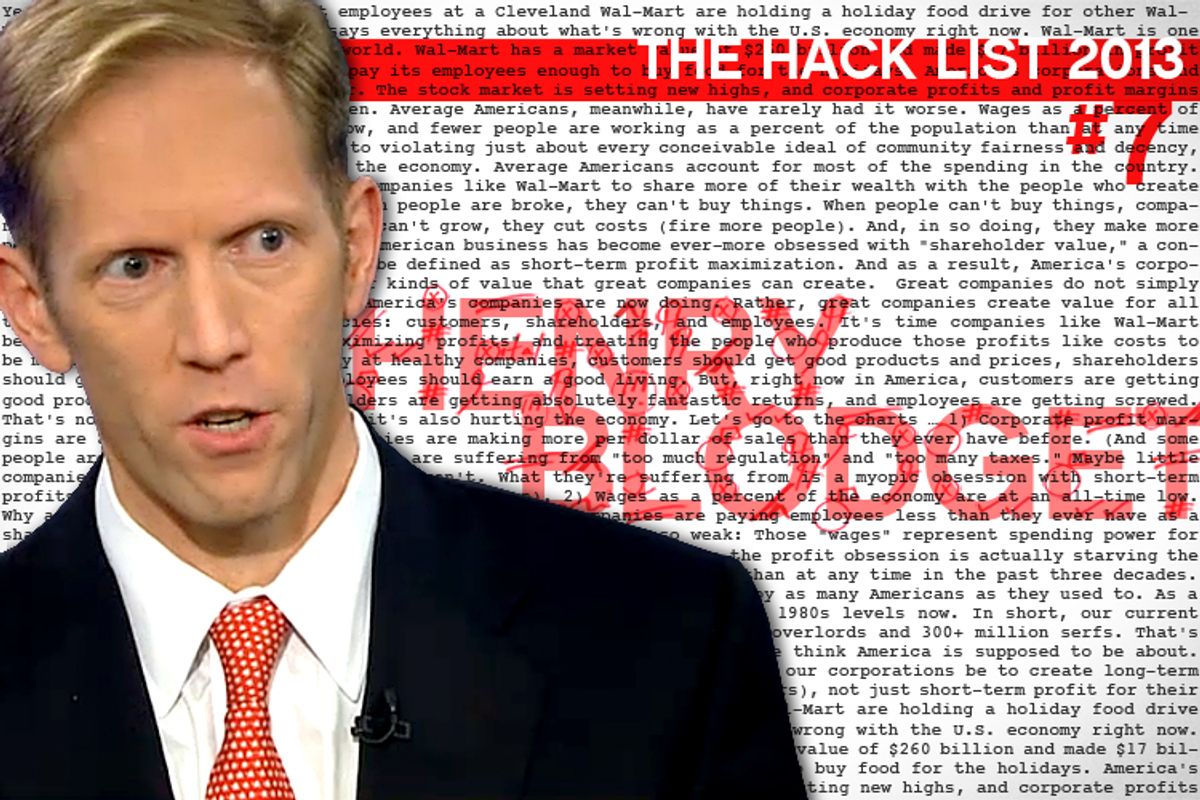I Was Confused by Some Things I Read That a Millionaire Wrote for His Financial News Website
A few months ago I was browsing the Internet, reading websites, when I clicked on a link to an article on a website called Business Insider. The article was about how a man named Henry Blodget flew on an airplane. He wrote, "I got a free pillow." And then, under that, he posted a picture of the pillow.
Most of the post was pictures, like that.
"This Blodget guy writes like a child," I thought. "Maybe like he is writing for children."
It turns out, though, that Henry Blodget is a grown-up, and not only that, he is a rich and successful grown-up! He used to work on Wall Street, until he did crimes and they told him he couldn't work on Wall Street anymore, ever again.
So he started a website. The website seems like it should be about business news, because it is called "Business Insider," and the founder of the website probably knows a lot about business stuff from back in the day when he picked stocks and stuff. But that is not what the website is about, mostly!
Henry Blodget is very proud of his website. "Last month, this readership made us the third biggest digital business news publication, behind only the Wall Street Journal and Forbes." But is Business Insider a business news publication? Some of the articles are about business, but a lot of them aren't! Here are some of the articles I saw on the front page of the website when I looked at it last week:
How to Unroll an Orange Instead Of Peeling It
The 5 Worst TV Shows of 2013
Mesmerizing Time-Lapse Shows California As You've Never Seen It
George and Martha Washington Had a Super-Strong Eggnog Recipe That We Can't Wait to Make
12 Sayings Only People From California Will Understand
So it seems like Business Insider is a website that sometimes has business stuff on it. Mostly it seems like Business Insider is a website that is about publishing anything at all that people will hopefully click on.
(In fairness to Business Insider, they have some smart people who write things for them, like Joe Weisenthal and Josh Barro. And maybe other people, too!)
The most confusing thing about Business Insider is when Henry Blodget writes things himself that aren't really about business. Why does he do this? Maybe he thinks the people who read his website are dumb. There is a lot of evidence for this idea. His website has stupid headlines.
One thing they do a lot is take long stories they found other places and make those stories shorter and dumber, with more pictures. But everyone on the Internet does that sometimes, or all the time. What not everyone on the Internet does is write strange faux-naif essays about getting haircuts and riding airplanes.
Everyone agreed that the airplane story was very stupid, but is Henry Blodget is as stupid as he writes like he is? Sometimes, like in the haircut story, it seems like Henry Blodget is trying to be funny. He learned important business lessons at a barbershop! That's funny!
Other times, though, Henry Blodget does not seem like he meant to be funny. The same funny voice that is funny when you are talking about newspapers is less funny when you are talking about institutional sexism or the history of antisemitism.
Sometimes when he writes articles like that he has to change them after he is done with them because people think they are offensive. But sometimes he changes them to be worse!
A little while ago, Henry Blodget went to a restaurant to talk with Nick Denton, a man who owns some different websites that are in some ways similar to Business Insider but in other ways different. Henry Blodget went to the bathroom at the restaurant. The restaurant is very expensive, so it is mostly for rich people. This expensive fancy restaurant had an employee whose job was to stay in the bathroom for his entire shift and then help people wash and dry their hands.
This man was paid a little bit of money by the restaurant, but he mostly worked for "tips," which is extra money customers give certain employees who aren't paid very much by their bosses.
The man whose job it was to stand in the bathroom all day made Henry Blodget uncomfortable. He forced Henry Blodget to think about things that maybe Henry Blodget didn't want to think about when he was just trying to eat a very expensive lunch with his friend, who, like Henry Blodget, has a lot of money.
First of all, he had to think about the awkwardness of being in such close proximity to another man, a man whose job it is to serve you, while engaged in the intimate act of urination.
Second, he had to think about the ways in which an economic and social system we call "capitalism" had made people like Henry Blodget so wealthy that there arose both the demand for workers whose jobs it is to dry the hands of people like Henry Blodget and a large number of people willing to take those jobs.
This is how Henry Blodget wrote about it: "First of all, it wastes water. Second, it makes me feel like I’m the kind of guy who dreams of being rich enough to be able to pay someone to turn on the water for me."
Henry Blodget doesn't even know that he is already that rich! There was already a man doing that job!
He decided it would be better if those people just went away, so that Henry Blodget didn't have to think about those things at lunch. So he wrote an article for his website that said there shouldn't be people who do that job anymore.
The man who owned the restaurant decided he agreed with Henry Blodget and he said he would fire all the people who did that job. This was the logical response to Henry Blodget's article, but it meant that now instead of having jobs that were maybe "bad," now these people didn't have any jobs.
(Later that man realized that firing all those people was probably bad "public relations" so he promised that they would all get different jobs.)
What do you think? Is Henry Blodget stupid? Is Henry Blodget trying to make everyone stupid? I think he thinks everyone already is stupid.
Henry Blodget
From Wikipedia, the free encyclopedia
For the 19th century U.S. federal judge, see Henry Williams Blodgett.
Henry Blodget on June 26, 2012, in New York City.
Henry Blodget (born 1966) is an American former equity research analyst who was senior Internet analyst for CIBC Oppenheimer and the head of the global Internet research team at Merrill Lynch during the dot-com bubble.[1] Blodget is now the editor and CEO of The Business Insider, a business news and analysis site, and a host of Yahoo Daily Ticker, a finance show on Yahoo.
Contents [hide]
1 Early life
2 Fraud allegation and settlement
3 Writing
4 Internet broadcaster
5 Books
6 References
7 External links
Early life [edit]
Blodget was born and raised on Manhattan's Upper East Side, the son of a commercial banker. He attended Phillips Exeter Academy and received a Bachelor of Arts degree in History from Yale University. After college, he taught English in Japan, then moved to San Francisco to try to be a writer while supporting himself by giving tennis lessons. He was also a freelance journalist and a proofreader for Harper's Magazine.[1]
In 1994, Blodget joined the corporate finance training program at Prudential Securities, and, two years later, moved to Oppenheimer & Co. in equity research. He became famous in October 1998,[2] when he predicted that Amazon.com, an Internet stock which had been a public company for a year then trading at $240 and which many on Wall Street were bearish on, would hit what many considered an outrageously bullish one-year price target of $400. Three weeks later Amazon zoomed past it gaining 128%.
This call received significant media attention, and, two months later, he accepted a position at Merrill Lynch, where he earned as much as $12 million a year.[2][3] In those days he became a media celebrity and frequently appeared on CNBC and other similar shows. In early 2000, days before the dot-com bubble burst, Blodget personally invested $700,000 in tech stocks, only to lose most of it in the years that followed.[4] In 2001, he accepted a buyout offer from Merrill Lynch and left the firm.[1]
Fraud allegation and settlement [edit]
In 2002, then New York State Attorney General Eliot Spitzer published Merrill Lynch e-mails in which Blodget gave assessments about stocks which allegedly conflicted with what was publicly published.[5] In 2003, he was charged with civil securities fraud by the U.S. Securities and Exchange Commission.[6] He agreed to a permanent ban from the securities industry and paid a $2 million fine plus a $2 million disgorgement.[7]
Writing [edit]
He became the CEO, Co-Founder, and Editor in Chief of Silicon Alley Insider (http://www.alleyinsider.com/), where he was a frequent contributor to the Seeking Alpha website. Prior to co-founding Silicon Alley Insider, Henry served as CEO of Cherry Hill Research, a research and consulting firm, and contributed to Slate, Newsweek International, The New York Times, Fortune, Forbes Online, Business 2.0, Euromoney, New York, Financial Times, and other publications. As of 2012, he is the CEO/editor-in-chief of The Business Insider, a blog about Internet business trends and research. He is a frequent contributor to the magazines Slate, Newsweek and New York. He began writing for Slate in January 2004, initially covering the Martha Stewart trials. In July 2004, Blodget began writing a four-part, 13 article, series entitled "The Wall Street Self-Defense Manual" for the magazine.[8]
Blodget's later articles for the magazine have focused on the return-limiting actions of individual investors, including listening to analysts and the financial media, and relying on active management such as mutual and hedge funds. His Slate articles about investing carry a seven-paragraph disclosure of potential conflicts of interest.[4]
He published The Wall Street Self-Defense Manual: A Consumer's Guide to Intelligent Investing in January 2007.
He currently lives in Brooklyn.
Internet broadcaster [edit]
As of April 2011, Blodget co-hosts the The Daily-Ticker[9] broadcast with Aaron Task weekdays at Yahoo! Finance.
Books [edit]
The Wall Street Self-Defense Manual: A Consumer's Guide to Intelligent Investing. Atlas Books, 2007. ISBN 0-9777433-2-2.





Shares